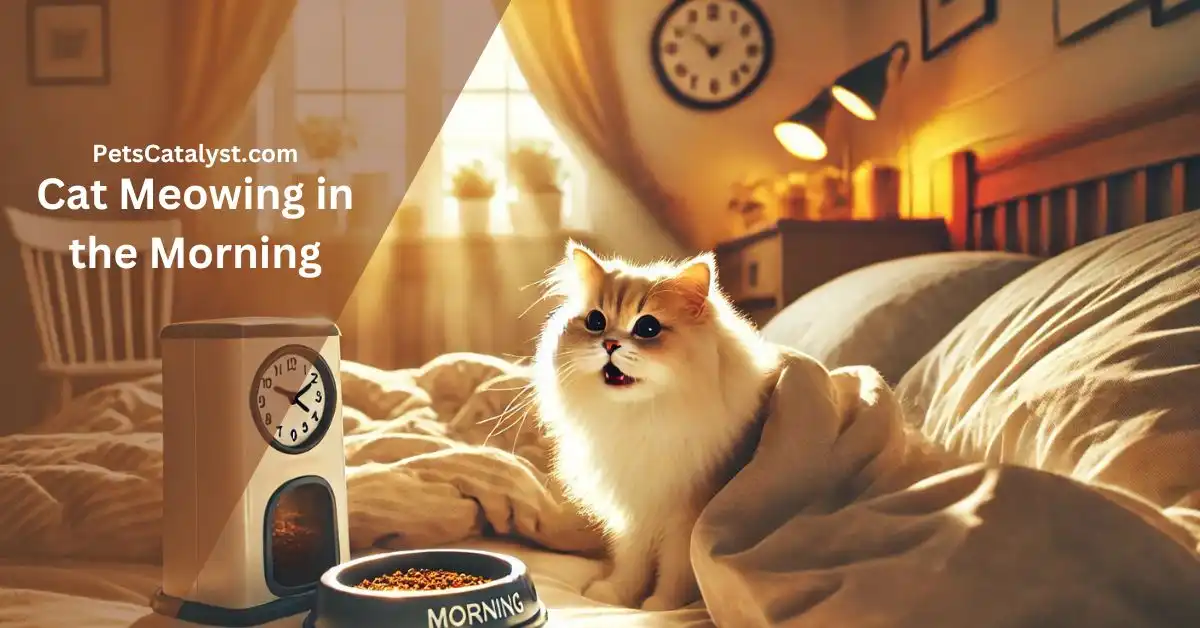Is your cat becoming your morning meow alarm clock every day? Not unique to you if you have woken up to your Cat Meowing in the Morning. When all you want is just five more minutes of beauty sleep—cats have a virtually superhuman ability to turn their furry bodies and faces into an alarm clock.
Believe me, as a long-time housemate of cats, I know what these dawn chorus numbers are like. My cat Whiskers put on an opera last week at 4:30 AM! Let’s talk about why your cat suddenly turns into a little morning concert performer, and more importantly, how to get your morning peace back.
The Science Behind Early Morning Cat Concerts
Because I spent many years as a pet parent and animal lover, I know my cat isn’t simply being jerks when they start meowing at dawn. We at least know there’s cool science behind this behavior. At first, I thought there was something wrong with me or maybe my cat, when he began his morning serenade; but it turns out, kitty songs are programmed into their DNA.
Why Do Cats Pick Dawn for Their Performances?
- Natural Hunting Time: Dawn is prime hunting hours in the wild.
- Internal Clock: Cats are crepuscular (most active at dawn and dusk).
- Temperature Changes: Morning brings cooler air and increased activity.
- Light Sensitivity: Even slight changes in light can trigger alertness.
You May Like to Read:
Common Reasons for Cat Meowing in the Morning
Having dealt with this myself (and helped countless other pet parents through PetsCatalyst), here are the main culprits behind cat meowing in the morning:

Hunger or Thirst
Imagine your cat as a very demanding restaurant critic. It’s 6 AM, and they’re telling you the food service is terribly delayed. Yes, hunger is a primary reason for cats meowing in the morning. Cats don’t exactly grasp the concept of “weekend lie-ins” or “five more minutes,” so if their food bowl isn’t topped off, you’ll hear about it.
Top Tip: To avoid these wake-up calls, establish a consistent feeding schedule. If your cat demands breakfast at the crack of dawn, consider an automatic feeder. That way, you can sleep while your cat’s “restaurant” opens on time.
Attention Seeking
Cats are independent animals… until they decide they aren’t. Another possibility is that the meowing in the morning is a call for attention. Perhaps your feline is in the mood to play, cuddle, or just wants to remind you that you live to serve them.
Signs: If your cat rubs you, purrs immediately in your face or tries to get in your face, it is a sign they want to be paid attention to.
A little humor here: Remember, cats are like that one friend who’s great at ghosting you until they suddenly need help moving a couch (or, in your cat’s case, a fresh lap).
Habit or Routine
Cats are creatures of habit, and if you’ve ever accidentally rewarded morning meowing with attention (yes, even yelling counts), they’ve learned that it works. Meowing becomes part of their morning routine, like your coffee or groggy scroll through social media.
Reschedules their Routine: Try gradually changing the timing of feeding and play sessions to shift their internal clocks. And remember, consistency is key.
Stress or Anxiety
Mewing in the morning can also indicate worry in cats. Household changes, separation stress, or just maybe the other animals outside can cause this anxiety.
Resolution: Build a tranquil setting. You can let your stressed out kitty ease up with the help of pheromone diffuser and comfy hiding spots. If it continues then you might try talking to your vet.
Medical Issues
A cat meowing in the morning isn’t always a cry for food or attention but sometimes it is a cry for help! Hyperthyroidism, arthritis, or cognitive dysfunction (especially in older cats) can make your cat vocal.
When to Be Concerned: If this meowing is a new behavior for your cat, more pronounced than before, or seems like your cat is in distress, then reach out to your veterinarian. Always better to play it safe.
You May Like to Read:
How to Address Morning Meowing
Before delving into solutions, it is important to understand the reasoning behind your furry friends letting their voices heard in the early hours of the morning. When I had my cat Whiskers she taught me that these wake up calls are not just random noise – but advanced attempts at communication!
Video Credit: AnimalWised
Establish a Consistent Routine
Cats thrive on routine. Make feeding times, play sessions, and cuddle moments predictable. If they know breakfast always happens at 7 AM, they’re less likely to meow starting at 5 AM.
Pro Tip: Stick to this routine, even on weekends. Yes, it’s a sacrifice, but your mornings will be quieter.
Increase Pre-Bedtime Play
A tired cat is a happy (and quieter) cat. Use interactive toys or a good ol’ laser pointer before bed to wear them out. It’s like tucking out a toddler after a day at the park.
Toy Recommendations: Puzzle feeders, feather wands, or even a sturdy cardboard box can work wonders.
Avoid Reinforcing the Behavior
If your cat meows and you immediately get up to feed or pet them, you’re reinforcing that meowing equals rewards. Even yelling can be perceived as attention. The trick? Ignore the meowing (if possible) and only give attention when they’re quiet.
Humor Note: Easier said than done, especially when your cat sounds like they’re auditioning for a feline opera.
Environmental Enrichment
Keep your cat entertained in the early hours. Window perches, bird-watching opportunities, and food-dispensing toys can make mornings more exciting for them and more peaceful for you.
Ideas: Install a bird feeder outside your window or place a cozy perch where they can observe the “morning news” outside.
When to Worry: Signs Your Cat Needs Medical Attention

While a little morning meowing is usually harmless, be alert for signs that it could be medical. Watch for:
- Changes in appetite or weight
- Lethargy or hyperactivity
- Distressed or painful sounds
If you notice any concerning symptoms, get advice from a vet. After all, better safe (and quiet) than sorry.
Frequently Asked Questions (FAQs)
Q: We want to get him to stop meowing in the morning! How long does it take?
Answer: Most cats will respond well to training between 2-3 weeks but this is based on my experience.
Q: Should I feed my cat when my he makes meow meow noises in the morning?
Answer: No, this encourages the behavior. Feed them only when they are quiet.
Q: What should I do when I ignore my cat and he meows more aggressively?
Answer: Hold steady — it may get worse before it gets better. This is normal!
Q: Can automatic feeders really help?
Answer: Absolutely! They have made my life easier and helped us stick firmly to a feeding schedule in our house.
Q: At what point is morning meowing a cause for concern?
Answer: Consult a vet as soon as possible if the behavior suddenly becomes extreme and accompanied by other behaviors.
Why your feline is doing it and what to do dealing with a cat meowing in the morning can feel like an Olympic challenge, but understanding why your furry companion does it makes it easier to manage. Regardless of whether your dog is hungry, just bored, or an underlying health issue, there are ways to achieve quieter mornings. And most importantly, if something feels off don’t hesitate to seek veterinary advice.
Follow Us: Facebook | X (previously Twitter)










